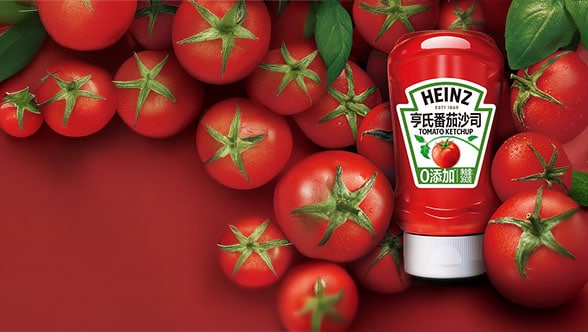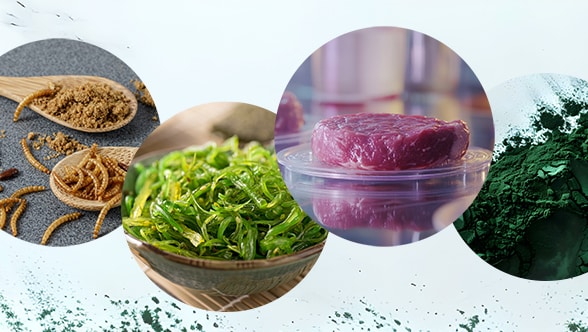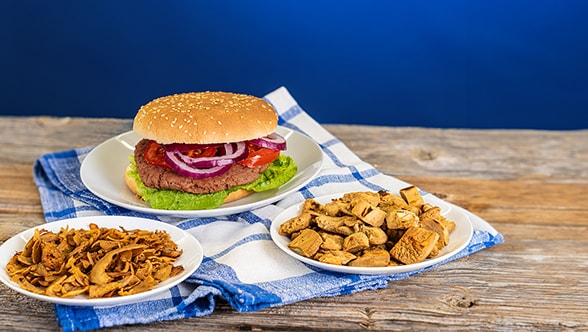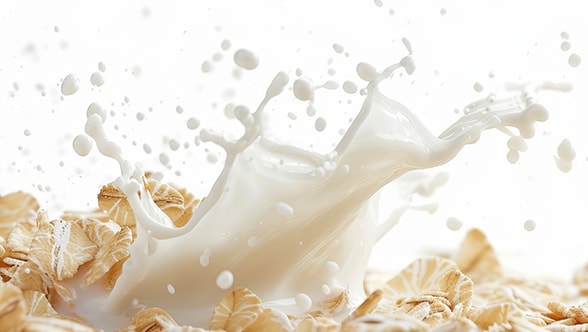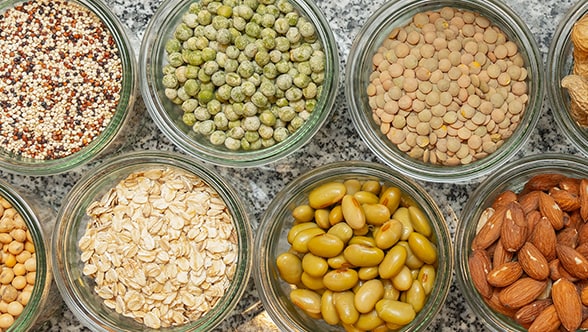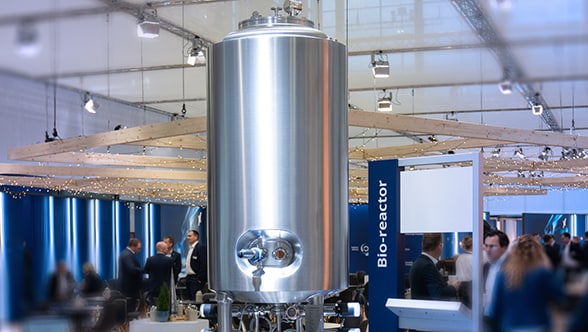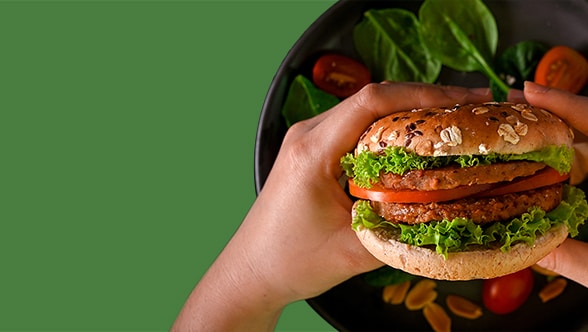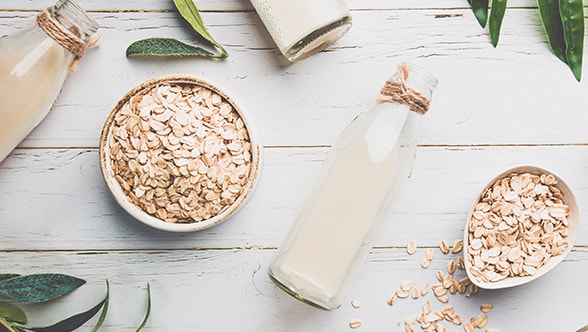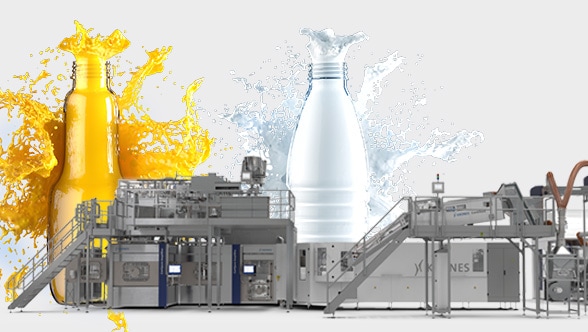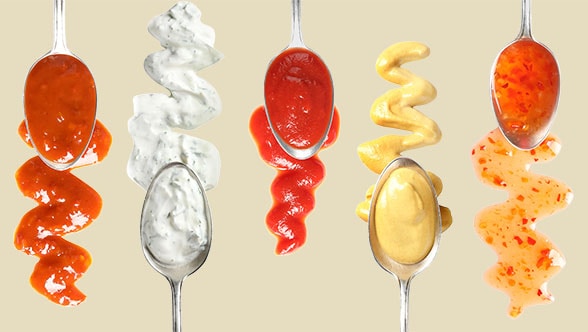Latte macchiato with an oats-based milk substitute or a bean burger – Whatever the reason people reach for meat or milk substitutes, in most cases they think these products have a positive effect on their health or benefit our natural environment. But is that actually true? Are they more sustainable and healthful, are they better? And how can companies fine-tune their products’ specific characteristics? The Krones Group’s alternative-food experts answer these and other frequently asked questions in regard to alternative proteins in this article.
Let us introduce you to the Krones Group’s alternative-food experts and bring you up to speed on the increasingly varied world of meat and milk substitutes.

Are substitutes more sustainable than meat or cow’s milk?
Maike Fischer: That is quite a tricky question because many different factors play a part here. Take almond drinks, for example: Almond trees are heavy consumers of water, and a large proportion of almonds are grown in California of all places – a very dry area. Oat drinks, on the other hand, achieve a better environmental performance. Oats can be grown locally in many regions, do not need so much water and pesticides, and their carbon footprint is smaller than that of cow’s milk.
The points that really matter as far as the climate impact of meat alternatives is concerned are also where they come from and how they are made. So you should always pay attention to the list of ingredients when buying substitutes. For instance, does the producer do without climate-harming palm oil?
So not all meat alternatives are the same. Does that also apply in terms of health-related aspects? Are substitutes more healthful than conventionally produced meat?
Maike Fischer: Statistically, people who eat a lot of meat and sausage will develop diabetes, cardiovascular disorders or colorectal cancer more often than the rest of the population. Nevertheless, you cannot say that meat as such is unhealthy because it also contains important nutrients like vitamin B12, iron and proteins. However, the WHO recommends eating smaller amounts of meat.
The basic aim should be to live on a wholefood diet, be it with small amounts of meat or entirely without it.
 Maike FischerSales Food and Beverage
Maike FischerSales Food and Beverage
Alexander Scheidel: One of the significant advantages offered by plant-based meat alternatives is that they contain a lot of fibre, which is of vital importance for the microbiome in our intestines. We eat far fewer pulses these days than people used to eat in the past, and meat substitutes based on peas or beans, for example, may be one way to increase our intake of fibre.
Maike Fischer: Exactly. But it is important to pay attention to the ingredients. No two substitutes are the same.
Today, you can mostly choose from a huge range of non-dairy drinks in the supermarkets. Which products should I buy with a view to my own health and the environment?
Alexander Scheidel: As far as overall environmental performance is concerned, oat drinks are clearly out in front as Maike explained earlier on. The conditions needed for growing oats are relatively simple, which means they can mostly be sourced regionally. Moreover, oats require only small amounts of water and meet ecological criteria better than cow’s milk, which has a poor carbon footprint. Soy drinks are closest to cow’s milk in terms of nutritional physiology because both contain similar amounts of protein. However, soy’s overall environmental performance is not good. In places where rice is grown in Asia, rice drinks can also be given good ratings against ecological criteria. Almond drinks are scoring highly with many people because they taste good, but their ecological footprint, alas, leaves a lot to be desired.
So the devil is in the details for all these aspects. It’s impossible to make a blanket statement. Differences mainly depend on whether the information is given for one litre of finished beverage or a defined quantity of protein added. Consumers need that information, so they can choose a product that suits their taste, ethics or health concept. Some of the current scientific studies provide accurate classification in this context and help consumers make an informed choice.
As far as health is concerned, you have to know that animal and vegetable products contain different types of protein. The bioavailability of the various proteins cannot be compared one to one, and one is not better or worse than the other. How far allergens and food intolerances must be taken into account will depend on the individual consumer: Obviously, people suffering from lactose intolerance will want to avoid cow’s milk. Conversely, cow’s milk is the best bet for persons who want to increase their calcium intake.
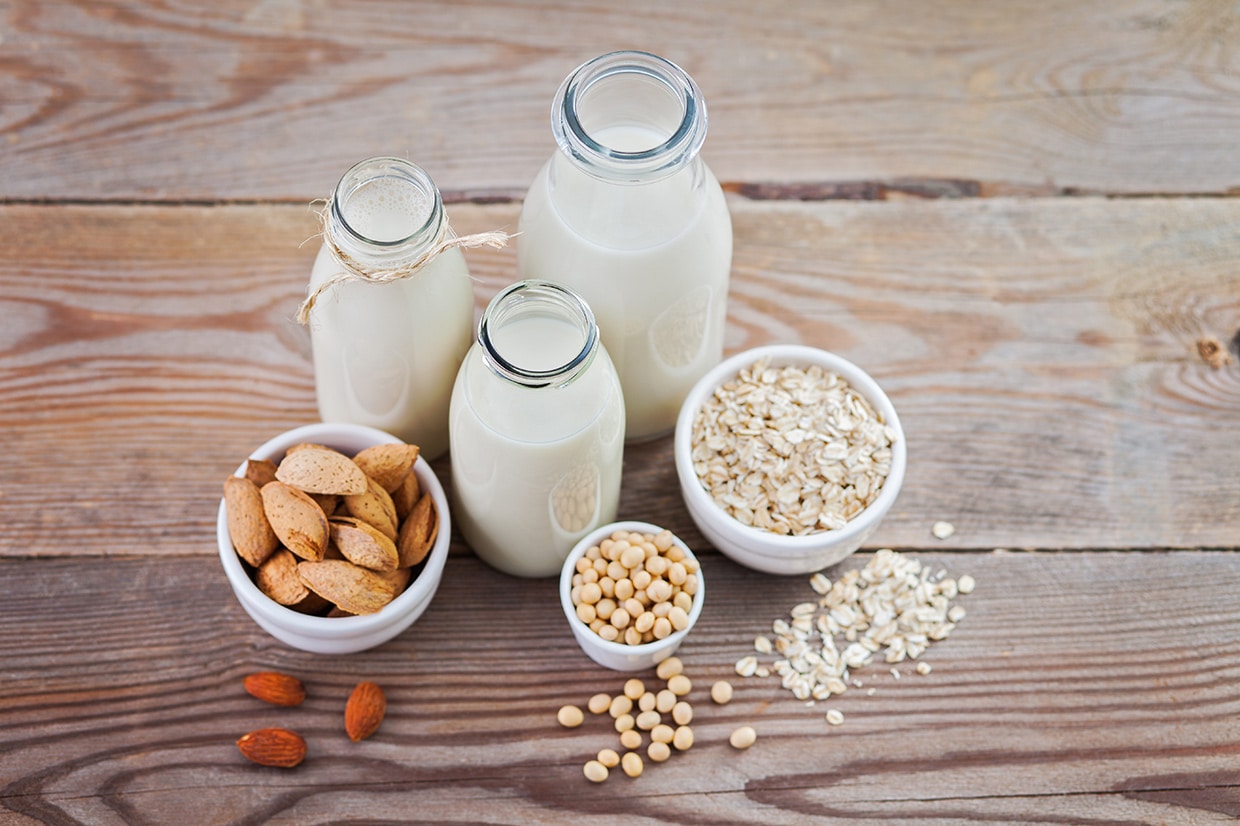
Florian Stauber: It is widely known that cow’s milk contains calcium, which is not present by nature in non-dairy drinks but is usually added. It does not have to be artificial. Calcium can also be added in the form of microalgae, a good natural source. You see, manufacturers of many plant-based alternatives aim to make sure the nutrients added are similar to those found in the conventional product.
So just as with any type of food the crucial point is what the substitutes are made of. There are simple oat drinks consisting of oats, water and salt, and others to which sunflower oil is added for taste. And then there are those enriched with calcium and vitamins. The range of non-dairy drinks to choose from is huge, and consumers can decide what is more important to them: taste, nutrients, texture, a minimum of additives, and so on.
Vegan protein puddings, Barista milk and many other products are meanwhile on offer. Is there a discernible trend for the future?
Florian Stauber: Oat drinks are very popular right now. They score well with young consumers and adults alike because they are so versatile: They can be used for breakfast cereal, coffee and much, much more. In addition, they boast a lengthy shelf life and can be produced organically.
Alexander Scheidel: The “Clean-Label” is a major goal for many producers. The trend continues towards minimally processed foods, which means foods that contain as few additives and aroma compounds as possible. These are like a blank canvas because it is left to consumers how they prepare them and what they add to them.
Maike Fischer: One exciting option, in my view, are hybrid products, which are made of meat and plant-based meat substitutes, like a bratwurst consisting of a mixture of meat and pulses like lentils, beans or peas. Needless to say, that’s out of the question for vegetarians and vegans but it appeals to a different target group which is growing. You see, these hybrid products are the ideal solution for all those who want to reduce meat consumption but don’t want to do without the taste of conventionally produced meat. These hybrids are very easy to cook at home and definitely help reduce overall meat production and the emissions it entails!
Florian Stauber: Consumers spend less and less of their time in the kitchen nowadays and will gladly accept products that are already prepared for them by the food industry. And that’s exactly where these hybrids come into play because they are easier to cook.
Alexander Scheidel: What it all comes down to is this: You can live on a healthy diet either with or without meat and/or milk, but only when you base your choice of foods on an informed assessment, when you’re prepared to pay a bit more and spend more time on food preparation.
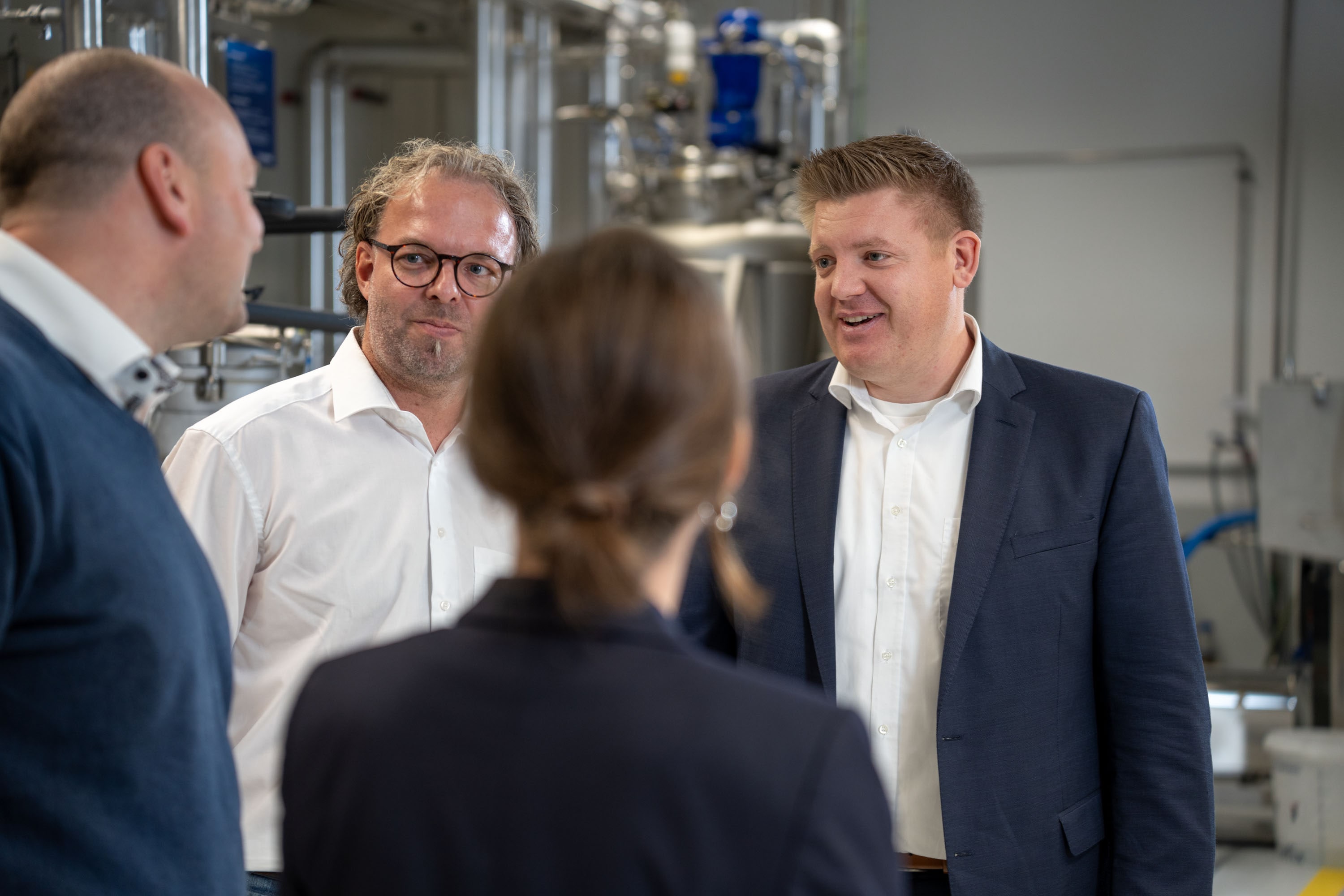
Manufacturers of meat and milk substitutes can use the product development centres of the Krones Group to optimise their foods’ characteristics both in terms of taste and health-related aspects. How exactly does that work?
Stefan Höller: The specific composition of oat drinks, for example, differs from that of cow’s milk, and so the parameters used for designing a line are different, too. We can test that in our Process Technology Centre in Neutraubling on the UHT line installed there. We examine the product’s behaviour in the line and by doing so we find out how that affects its taste.
The advantage of running tests in the pilot plant and not on a production line is this: We gain valuable insights with a relatively small amount of raw material. That would only be possible to a limited extent on industrial-scale systems or it would entail substantial costs. Another plus is that our experimental line setup is much more flexible than that of a production line. Each of the production-relevant parameters can be modified individually – always, of course, supported by our experienced technology specialists. What’s more, hygienic bottling permits us to observe processes over a lengthy period of time.
What are the solutions offered by the Krones Group for the production of meat and milk substitutes?
Florian Stauber: The process for producing non-dairy drinks is very similar to that for brewing beer, so our experts have the requisite know-how enabling them to develop a delicious and safe product that can be made at affordable cost.
Alexander Scheidel: We have a broad equipment portfolio and can draw on in-depth expertise in process technology that we can also apply to new categories of food like meat alternatives. And we always keep an eye on maximising energy-efficiency in the production operation. That’s a constituent part of our group’s DNA. We want to design processes that are as energy-efficient as possible.


